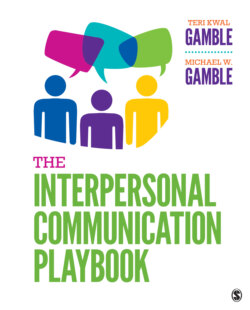Читать книгу The Interpersonal Communication Playbook - Teri Kwal Gamble - Страница 141
На сайте Литреса книга снята с продажи.
Technology and Perception
ОглавлениеLike media in general, technology has the potential to alter self- and self–other perceptions.53 Some, for example, see digital social connections pulling us closer into new kinds of communities. Others see them as pulling us apart by separating us from more local, personal interactions. Some contend that the ease with which we can link with others who share our interests and goals only helps to confirm our way of thinking creating communities of sameness. What do you think? Online, are we reproducing real social interactions or creating something altogether different? Might we be sacrificing serendipity for a false sense of companionship?
When digitally engaged, we make judgments of others—just as we do when others are physically present. Often these judgments involve other people’s cultures or gender. According to the social identity model of de-individuation effects (known as SIDE), we have different identities that make themselves visible in different situations.54 When we interact online, the lack of nonverbal cues, especially those related to appearance and sound, cause us to hold on more tightly to what we know about the other person’s group affiliations.55 This could compel us to become more judgmental, to make over-attributions (that is, single out one or two characteristics of a person), or to exaggerate the importance of the minimal information we have. We practice closure, often filling in the gaps by using stereotypes. If we assume that people share social categories with us, making them like us, we tend to find them more likable than if we believe they are different.
Virtual reality may have transformative effects on our perception of what’s real.
iStock.com/wonry
Technology affects us in other ways, too. Playing violent games online may increase aggressive behavior by causing heavy players to perceive annoying provocations as more hostile.56 The games also are apt to expand the repertoire of aggressive behaviors of users and emotionally desensitize players to aggression and violence.57 The potential effects of online gaming are not all negative, however. Playing action games has been found to enhance an individual’s ability to pay attention to objects and changes in the environment. Experienced gamers are 30 to 50 percent better than non-gamers at perceiving everything happening around them. It appears that gaming not only precipitates better spatial skills but also improves attention skills and facilitates the accurate understanding of a visual landscape.58
What about virtual reality technology? It may well have transformative effects on perception—widening experience by its use of immersive stories that help enlarge human empathy, simulations that improve observational skills, imagined experiences that can help those affected recover from trauma, as well as opportunities for connection. On the other hand, it could also be used to spread propaganda and be employed to simulate torture that actually feels real.59
Because of the vastness of the virtual landscape, interacting online may be affecting our perceptual focus by making it difficult for us to concentrate on any one thing for a sustained period of time. We frequently divide our focus, viewing multiple screens simultaneously, as we watch TV, Web surf for information related to what we are watching, or exchange messages with others about what we are viewing.60 Typically, we hurry from one stimulus to another, sneaking peeks at people and sites, but not paying close attention to any.61 Continued decreases in attention is one reason theorists give to account for the migration of younger users from Facebook to Snapchat. When interviewed, younger users complain that interacting on Facebook consumes too much time, while Snapchat is less demanding and allows their minds to move more quickly.62
The Internet also affects how we remember. We pay more attention to and are more likely to remember information if we think we will not be able to find it later. For many, the Internet is becoming a primary system for information storage. We have found a new means of outsourcing memory.63
